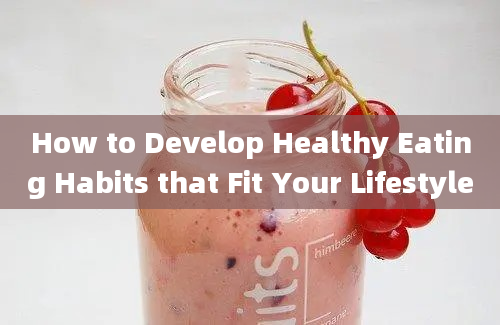How to Develop Healthy Eating Habits that Fit Your Lifestyle

Developing healthy eating habits is crucial for maintaining overall wellbeing, but it can be challenging to integrate these habits into a busy lifestyle. According to the Harvard T.H. Chan School of Public Health, a balanced diet rich in fruits, vegetables, whole grains, and lean proteins can significantly reduce the risk of chronic diseases such as heart disease, diabetes, and certain cancers. [Harvard T.H. Chan School of Public Health](https://www.hsph.harvard.edu/nutritionsource/)
1. Understand Your Current Eating Habits
The first step in developing healthy eating habits is to assess your current diet. Keep a food diary for a week to track what you eat, when you eat, and how much you eat. This will help you identify areas that need improvement. The Centers for Disease Control and Prevention (CDC) recommends using a food diary to gain insight into your eating patterns. [CDC Improving Your Eating Habits](https://www.cdc.gov/healthyweight/healthy_eating/index.html)
2. Set Realistic Goals
Once you have a clear understanding of your current eating habits, set achievable goals. According to the American Heart Association, setting small, realistic goals can lead to longterm success. For example, you might start by adding one serving of vegetables to your daily diet or replacing sugary drinks with water. [American Heart Association Healthy Eating Goals](https://www.heart.org/en/healthyliving/healthyeating/eatsmart/nutritionbasics/ahadietandlifestylerecommendations)
3. Plan Your Meals
Meal planning is a powerful tool for maintaining healthy eating habits. The Academy of Nutrition and Dietetics suggests that planning meals in advance can help you make healthier choices and avoid impulsive eating. Create a weekly meal plan and grocery list to ensure you have healthy options readily available. [Academy of Nutrition and Dietetics Meal Planning](https://www.eatright.org/food/nutrition/healthyeating/mealplanningforhealthyeating)
4. Incorporate a Variety of Foods
A diverse diet ensures you get all the necessary nutrients. The World Health Organization (WHO) recommends eating a wide range of foods, including fruits, vegetables, legumes, nuts, and whole grains. This not only provides essential vitamins and minerals but also makes meals more enjoyable. [WHO Healthy Diet](https://www.who.int/newsroom/factsheets/detail/healthydiet)
5. Control Portion Sizes
Overeating, even healthy foods, can lead to weight gain. The U.S. Department of Agriculture (USDA) offers guidelines on portion sizes through their MyPlate initiative. Using smaller plates, measuring servings, and being mindful of hunger and fullness cues can help control portion sizes. [USDA MyPlate](https://www.myplate.gov/)
6. Limit Processed Foods and Sugars
Processed foods and added sugars are major contributors to unhealthy eating habits. The American Diabetes Association advises limiting the intake of processed foods and sugary beverages to reduce the risk of diabetes and other health issues. Opt for whole, unprocessed foods whenever possible. [American Diabetes Association Healthy Eating](https://www.diabetes.org/nutrition)
7. Stay Hydrated
Drinking enough water is essential for overall health. The National Academies of Sciences, Engineering, and Medicine recommend that men consume about 3.7 liters (125 ounces) and women about 2.7 liters (91 ounces) of water per day from all beverages and foods. [National Academies of Sciences, Engineering, and Medicine Water Intake](https://www.nationalacademies.org/news/2004/02/reportsetsnewstandardsforwaterintake)
8. Be Mindful of Eating
Mindful eating involves paying attention to the experience of eating and being aware of hunger and fullness cues. The Mayo Clinic suggests that mindful eating can help you enjoy your food more and may lead to better food choices. [Mayo Clinic Mindful Eating](https://www.mayoclinic.org/healthylifestyle/nutritionandhealthyeating/indepth/mindfuleating/art20046903)
9. Seek Professional Guidance
If you're struggling to develop healthy eating habits, consider seeking advice from a registered dietitian or nutritionist. The Academy of Nutrition and Dietetics provides resources to find a qualified professional who can offer personalized guidance. [Academy of Nutrition and Dietetics Find an Expert](https://www.eatright.org/findanexpert)
10. Make It a Lifestyle
Healthy eating is not a shortterm diet but a lifelong commitment. According to the National Institutes of Health, making gradual changes and incorporating healthy eating into your daily routine can lead to sustainable habits. [National Institutes of Health Healthy Eating](https://www.nih.gov/healthinformation/weightmanagement)
Frequently Asked Questions (FAQs)
Q1: Why is it important to develop healthy eating habits?
A1: Developing healthy eating habits is crucial for maintaining overall wellbeing, reducing the risk of chronic diseases such as heart disease, diabetes, and certain cancers, and improving energy levels and mental health. [Harvard T.H. Chan School of Public Health](https://www.hsph.harvard.edu/nutritionsource/)
Q2: How can I assess my current eating habits?
A2: Keep a food diary for a week to track what you eat, when you eat, and how much you eat. This will help you identify areas that need improvement. [CDC Improving Your Eating Habits](https://www.cdc.gov/healthyweight/healthy_eating/index.html)
Q3: What are some realistic goals for healthy eating?
A3: Set small, achievable goals such as adding one serving of vegetables to your daily diet or replacing sugary drinks with water. [American Heart Association Healthy Eating Goals](https://www.heart.org/en/healthyliving/healthyeating/eatsmart/nutritionbasics/ahadietandlifestylerecommendations)
Q4: How can meal planning help in maintaining healthy eating habits?
A4: Meal planning helps you make healthier choices, avoid impulsive eating, and ensures you have healthy options readily available. [Academy of Nutrition and Dietetics Meal Planning](https://www.eatright.org/food/nutrition/healthyeating/mealplanningforhealthyeating)
Q5: Why is it important to eat a variety of foods?
A5: Eating a diverse diet ensures you get all the necessary nutrients and makes meals more enjoyable. [WHO Healthy Diet](https://www.who.int/newsroom/factsheets/detail/healthydiet)
Q6: How can I control portion sizes?
A6: Use smaller plates, measure servings, and be mindful of hunger and fullness cues to control portion sizes. [USDA MyPlate](https://www.myplate.gov/)
Q7: Why should I limit processed foods and sugars?
A7: Limiting processed foods and added sugars reduces the risk of diabetes and other health issues. [American Diabetes Association Healthy Eating](https://www.diabetes.org/nutrition)
Q8: How much water should I drink daily?
A8: Men should consume about 3.7 liters (125 ounces) and women about 2.7 liters (91 ounces) of water per day from all beverages and foods. [National Academies of Sciences, Engineering, and Medicine Water Intake](https://www.nationalacademies.org/news/2004/02/reportsetsnewstandardsforwaterintake)
Q9: What is mindful eating and how can it help?
A9: Mindful eating involves paying attention to the experience of eating and being aware of hunger and fullness cues, which can help you enjoy your food more and make better food choices. [Mayo Clinic Mindful Eating](https://www.mayoclinic.org/healthylifestyle/nutritionandhealthyeating/indepth/mindfuleating/art20046903)
Q10: Where can I find professional guidance for healthy eating?
A10: You can find a registered dietitian or nutritionist through the Academy of Nutrition and Dietetics' resources. [Academy of Nutrition and Dietetics Find an Expert](https://www.eatright.org/findanexpert)










